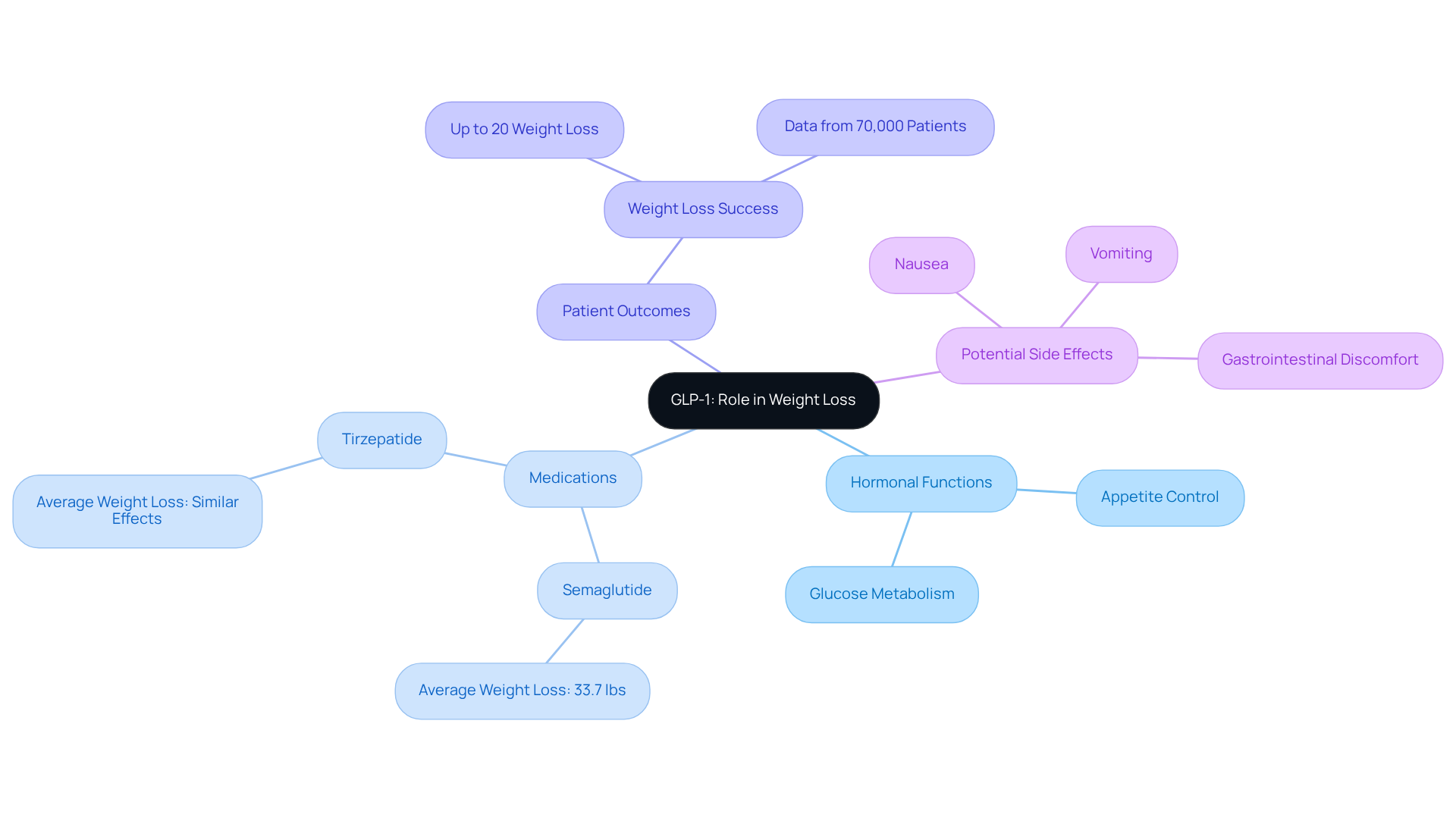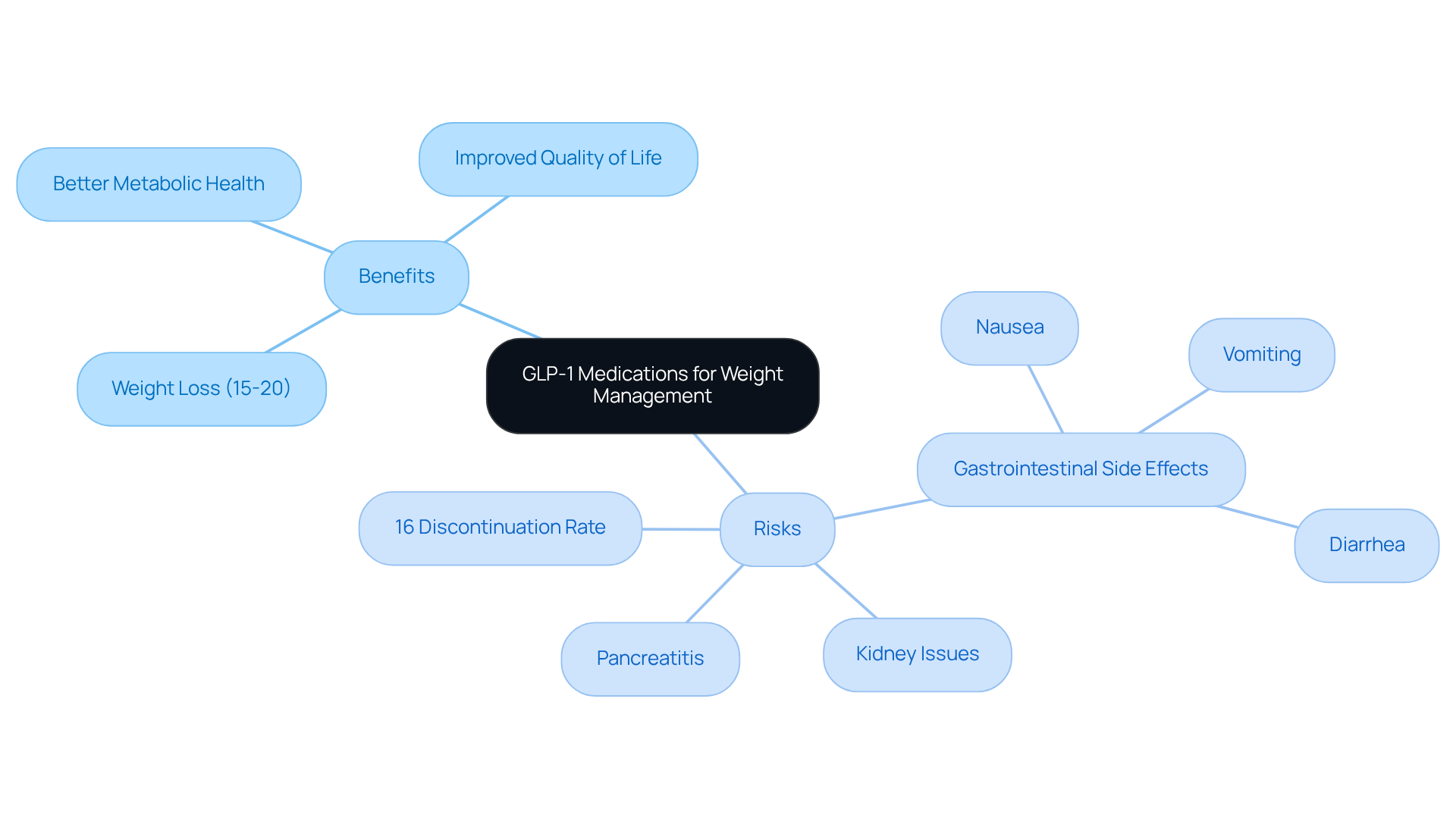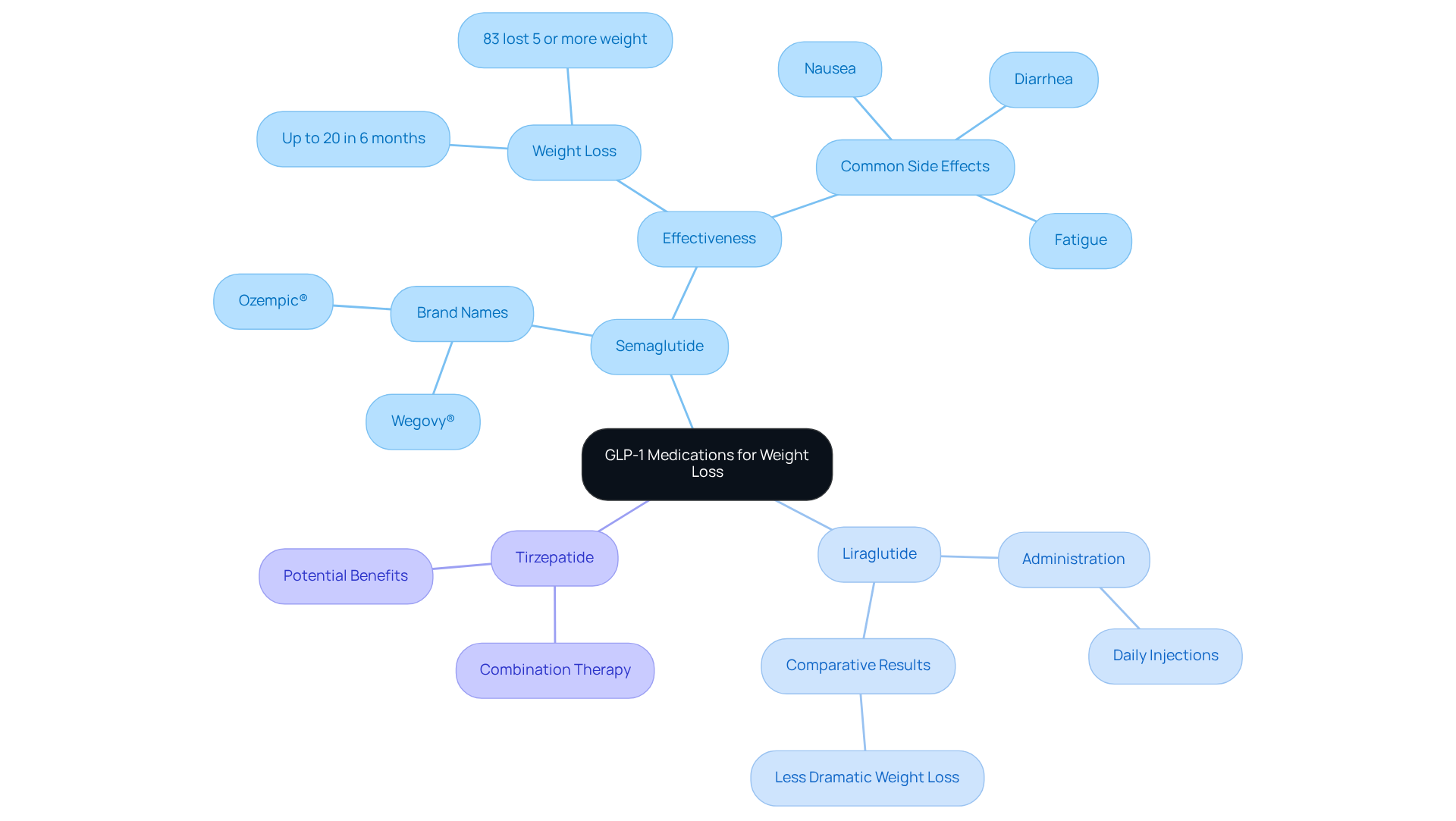Overview
GLP-1, or glucagon-like peptide-1, is a hormone that can be a helpful ally in your weight loss journey. It enhances satiety, improves glucose metabolism, and regulates appetite through medications like semaglutide and liraglutide. Many individuals may feel overwhelmed by their weight loss efforts, but it’s important to know that these treatments can lead to significant weight loss—up to 20% of body mass in some patients.
However, it’s also essential to consider potential side effects. This is where personalized healthcare approaches come into play, ensuring that you receive safe and effective treatment tailored to your needs. Remember, we’re here for you, and together, we can achieve your goals. By understanding these options, you can take meaningful steps toward a healthier future.
Introduction
The rising prevalence of obesity has sparked significant interest in innovative treatments that address this complex issue. Among these, glucagon-like peptide-1 (GLP-1) medications have emerged as a powerful tool, offering remarkable weight loss results and improved metabolic health.
However, as you consider these options, you may find yourself asking: What exactly is GLP-1, and how does it function in the body to facilitate weight loss? Understanding the mechanisms behind this hormone and the various medications available can unlock new pathways for those of us seeking effective solutions in our weight management journeys.
Together, we can explore these possibilities and find the right approach for you.
Defining GLP-1: What It Is and How It Works
Glucagon-like peptide-1, a hormone released in the intestines, plays a crucial role in appetite control and glucose metabolism. This incretin hormone is released after meals, helping to lower blood sugar levels by boosting insulin secretion and suppressing glucagon release. This dual action not only aids in glucose regulation but also supports body management by slowing gastric emptying, encouraging a prolonged feeling of fullness after eating.
If you’re feeling overwhelmed by your weight loss journey, recent research offers hope. People using certain medications, like semaglutide found in Wegovy and compounded Tirzepatide, have experienced an average reduction of around 33.7 pounds—significantly more than the 5.7 pounds lost by those not using these therapies. This finding highlights the effectiveness of these medications in combating obesity, particularly as they mimic the physiological effects of gastric bypass surgery, which also influences appetite control.
Experts emphasize the transformative potential of these medications in addressing obesity. Many patients have successfully achieved a reduction of 10% or more of their starting body mass. Real-world examples further illustrate this success. Data from over 70,000 patients show that many clients at Minimal have lost up to 20% of their mass within just six months of starting a GLP-1-based program.
Understanding how this hormone works is essential for anyone seeking effective solutions, such as GLP-1 for weight loss, to reduce body mass. It lays the foundation for innovative therapies that tackle both hunger and glucose metabolism, all supported by Minimal’s personalized care and extensive resources. We want you to know that while these medications can be effective, they may also have potential side effects, such as nausea, vomiting, and gastrointestinal discomfort.
At Minimal, we provide these transformative body reduction solutions through an e-commerce platform, with customized health journeys starting at just $99.99 per month. Together, we can achieve your goals, and we’re here to support you every step of the way.
The Role of GLP-1 in Weight Loss: Mechanisms and Applications
This hormone plays a significant role in weight loss through multiple mechanisms, including the use of glp-1 for weight loss, and we understand how challenging this journey can be. Primarily, it enhances satiety by targeting the brain’s appetite centers, leading to a decrease in food intake. Imagine feeling fuller for longer! Moreover, this compound slows gastric emptying, prolonging the feeling of fullness and assisting individuals in consuming fewer calories overall.
It’s important to recognize that treatments like Ozempic® and Wegovy® provide benefits beyond weight loss, including improved insulin sensitivity and glucose regulation, similar to glp-1 for weight loss. These are crucial elements for individuals managing obesity and type 2 diabetes. Many clients at Minimal have experienced remarkable success, losing up to 20% of their mass based on data from over 70,000 patients who have participated for at least six months. Wegovy is administered via a subcutaneous injection once a week, making it easy to incorporate into your routine.
These mechanisms highlight the efficacy of certain compounds, particularly glp-1 for weight loss, as a powerful partner in addressing obesity. The clinical achievements of treatments like Ozempic® and Wegovy® have demonstrated significant reductions in body mass, highlighting the role of GLP-1 for weight loss in multiple studies. However, we want to ensure you are informed about possible side effects, which can include nausea, vomiting, and other gastrointestinal problems.
The increasing approval of certain therapies, particularly glp-1 for weight loss, is also evident in the astonishing 2,082% rise in prescriptions from 2019 to 2022, indicating their growing popularity as successful solutions for reducing body mass. At Minimal, we’re here for you. We integrate these treatments with personalized fitness training and nutrition guidance to enhance your overall wellness. Together, we can achieve your goals and support you every step of the way.
Benefits and Risks of GLP-1 Medications for Weight Management
Managing body mass can feel overwhelming, but there are treatments available that offer significant advantages. Treatments like GLP-1 for weight loss can lead to substantial reductions in body weight, better metabolic health, and an improved quality of life. Research shows that individuals utilizing GLP-1 for weight loss over time can achieve a weight loss of between 15% to 20%, with 22% of individuals reaching a loss of 20% or more after 12 months.
However, it’s important to be aware of the potential risks associated with these medications. Gastrointestinal side effects, such as nausea, vomiting, and diarrhea, can occur, with nausea being a primary reason why some patients choose to discontinue Ozempic treatment. More serious risks, like pancreatitis and kidney issues, also exist. Thankfully, only about 16% of patients have had to stop using semaglutide or reduce their dosage due to side effects, indicating a level of tolerability.
We encourage patients to discuss these possible risks with their healthcare providers to ensure the safe and effective use of these medications. At Minimal, we emphasize a personalized approach to weight loss, integrating GLP-1 for weight loss with specific prescriptions and tailored fitness and nutrition advice. Our clients often experience improvements not just in managing their weight but also in their overall well-being.
Together, we can achieve your goals and highlight the importance of a comprehensive approach to attaining lasting health advancements. Remember, you’re not alone on this journey; we’re here for you every step of the way.
Types of GLP-1 Medications: Options for Weight Loss
Many individuals face challenges in their weight loss journeys, and it’s important to know that you’re not alone. Numerous drugs that are classified as GLP-1 for weight loss are authorized for reducing body mass, each with its unique features.
- Semaglutide, marketed as Ozempic® and Wegovy®, has gained prominence due to its substantial effectiveness shown in clinical trials. Many patients have achieved remarkable reductions in body mass, which can be incredibly encouraging.
- In contrast, liraglutide, sold as Saxenda®, usually requires daily injections and tends to lead to less dramatic weight loss results compared to semaglutide. For instance, studies indicate that patients using semaglutide may lose up to 20% of their body mass after just six months, while those on liraglutide often see more modest outcomes. This difference can be significant for those seeking to make impactful changes in their lives.
- Moreover, recent treatments like tirzepatide (Mounjaro®) combine a specific hormone with another, potentially offering even greater benefits for weight reduction. As the landscape of GLP-1 medications evolves, patients now have a wider array of options, including GLP-1 for weight loss, to support their weight loss journeys.
It’s essential to consult with healthcare providers to determine which choice is the most suitable for you. Remember, we’re here for you, and together, we can achieve your goals. Your journey is important, and finding the right support can make all the difference.
Conclusion
Understanding the role of GLP-1 in weight loss reveals its potential as a powerful tool in combating obesity. This hormone, integral to appetite regulation and glucose metabolism, opens up new avenues for those struggling with weight management. The advancements in GLP-1 medications, such as semaglutide and tirzepatide, provide effective options that can lead to significant weight loss, ultimately enhancing overall health and well-being.
Throughout this journey, it’s essential to recognize the mechanisms by which GLP-1 aids in weight loss. Increased satiety and improved metabolic health are just a few ways these treatments can support you. Real-world success stories emphasize the effectiveness of these medications, with many individuals achieving remarkable reductions in body mass. However, it’s also crucial to consider the potential side effects and risks associated with GLP-1 medications, ensuring a balanced understanding of their use.
As we navigate the evolving landscape of obesity treatment, embracing the benefits of GLP-1 medications can lead to transformative changes in health and quality of life. Engaging with healthcare professionals to identify the most suitable options and integrating personalized support can empower you on your weight loss journey. Remember, the significance of informed choices and comprehensive care cannot be overstated; they pave the way for lasting health advancements and a brighter future. Together, we can achieve your goals and foster a supportive community on this path to wellness.
Frequently Asked Questions
What is GLP-1 and what role does it play in the body?
GLP-1, or glucagon-like peptide-1, is a hormone released in the intestines that helps control appetite and glucose metabolism. It is released after meals to lower blood sugar levels by increasing insulin secretion and suppressing glucagon release, while also slowing gastric emptying to promote a feeling of fullness.
How do GLP-1 medications assist in weight loss?
Medications like semaglutide (found in Wegovy) and compounded Tirzepatide mimic the effects of gastric bypass surgery, helping to control appetite and resulting in significant weight loss. Users of these medications have experienced an average reduction of around 33.7 pounds, compared to 5.7 pounds for those not using these therapies.
What kind of weight loss results can patients expect from GLP-1-based programs?
Many patients have successfully lost 10% or more of their starting body mass. Data from over 70,000 patients show that clients at Minimal have lost up to 20% of their mass within six months of starting a GLP-1-based program.
Are there any potential side effects associated with GLP-1 medications?
Yes, potential side effects of GLP-1 medications may include nausea, vomiting, and gastrointestinal discomfort.
How does Minimal support individuals on their weight loss journey with GLP-1?
Minimal offers personalized care and extensive resources through an e-commerce platform, providing customized health journeys starting at $99.99 per month to help individuals achieve their weight loss goals.




















